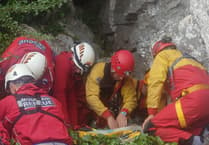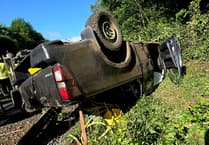SCHOOL inspectors have declared that South Dartmoor Community College needs to make improvements.
Following a two-day visit to the Ashburton college last month, each category – apart from the sixth form – was rated as ‘requiring improvement’.
The critical report marks a decline in the school’s standards from a previous good rating.
However, the inspectors acknowledged that the new principal Paul Collins has only been in the post since January, having previously been head of the main school, and they recognised that his new role has enabled him to make ‘positive changes’ linked to the leadership structure.
While the changes are showing the ‘seeds’ for improvement, there is no evidence of that yet to be seen.
Speaking after publication of the report, Mr Collins said: ‘We need to encourage pupils’ enthusiasm to learn, which we’re doing by making lessons more engaging.
‘There is a lot in the inspectors’ report to be proud of, and I am pleased that they see that this is a college in transition with
a lot of positive changes beginning to bear fruit.
‘There is more to do, and I am under no illusion otherwise.
‘These are still early days.
‘We have very many superb students and an absolutely excellent staff team and governor support who are all committed to bringing forward the improvements that I expect will lead to us being described in a Good position again within the next few years.’
He and new chief executive of the school’s trust, Rachel Shaw are driving forward improvements since their appointment in January, reshaping the top leadership structure and introducing a range of positive changes.
Lead inspector Steve Smith said in his report: ‘Leaders are successfully communicating a vision for high-quality teaching to the wider staff.’
He also said Mr Collins is ‘determined to improve the quality of pupils’ experience and raise their achievement’, which he says is beginning to work.
Inspectors said that a list of improvements need to be made including the quality of leadership and teaching.
Achievement levels of all pupils need to rise and there needs to be improvement of personal development.
The college sixth form comes in for praise, the only category of inspection to be considered good.
The report states it is well led, teachers have high expectations and set ambitious targets for students and there is good attendance.
Inspectors considered the number of pupils who are persistently absent in the main school, however, is too high.
However, the inspectors described staff as ‘doggedly persistent’ and using a wide range of strategies to improve attendance which is beginning to work.
They found that students lack enthusiasm for learning and said behaviour also needs to improve.
The report summary says: ‘Leaders’ evaluation of aspects of the school’s work is overgenerous.
‘Middle leaders do not consistently use assessment information to monitor the progress of pupils. Furthermore, this information is not accurate in all subjects.
‘Leaders do not check with sufficient rigour that their vision for high-quality teaching is evident in actual classroom practice.
‘Disadvantaged pupils are too often excluded from lessons and activities during the school day.
‘Staff do not have high enough expectations of what all pupils can achieve, including those who are disadvantaged.
‘The teaching of the careers education programme in the main school is too variable and leaders have not evaluated its effectiveness.
‘Teachers do not routinely adapt work and activities for the needs of pupils of different abilities.’
Among the positive aspects found during the inspection were effective safeguarding in which staff are well trained.
The report praised teachers across subject areas for their strong curriculum knowledge.
The inspector said: ‘They are receptive to new ideas, keen to develop their practice and are proactive about learning from each other’.
Pupils who spoke with inspectors reported that they feel safe and said that there are staff that they would happily talk to if they had concerns.
Another pupil said: ‘The pastoral care here is so good’, and another said ‘staff are easy to talk to and very understanding. They don’t judge you’.
The proportion of pupils excluded from the school is low and below schools nationally.
It says: ‘The principal and other leaders are steadily securing the support of staff and raising morale.
‘They are determined to improve pupils’ experience of school.
‘Pupils receive strong pastoral support for their emotional, social and behavioural needs.
‘Pupils benefit from a good range of extra-curricular activities, particularly in sports and the arts.’





Comments
This article has no comments yet. Be the first to leave a comment.